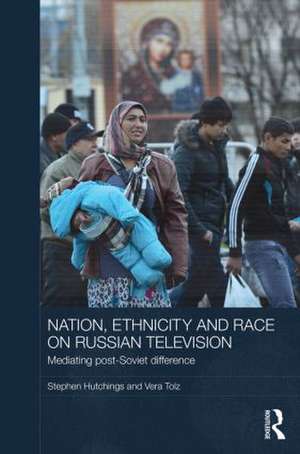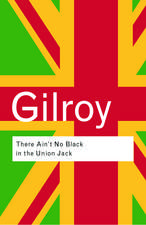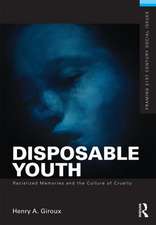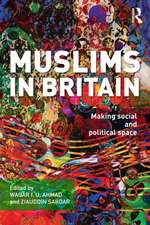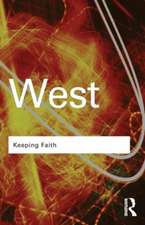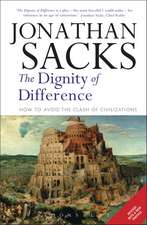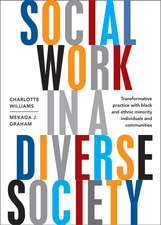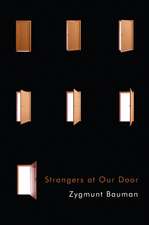Nation, Ethnicity and Race on Russian Television: Mediating Post-Soviet Difference: BASEES/Routledge Series on Russian and East European Studies
Autor Stephen Hutchings, Vera Tolzen Limba Engleză Hardback – 12 mar 2015
| Toate formatele și edițiile | Preț | Express |
|---|---|---|
| Paperback (1) | 436.14 lei 6-8 săpt. | |
| Taylor & Francis – 21 dec 2017 | 436.14 lei 6-8 săpt. | |
| Hardback (1) | 1058.65 lei 6-8 săpt. | |
| Taylor & Francis – 12 mar 2015 | 1058.65 lei 6-8 săpt. |
Din seria BASEES/Routledge Series on Russian and East European Studies
- 8%
 Preț: 382.69 lei
Preț: 382.69 lei -
 Preț: 228.19 lei
Preț: 228.19 lei -
 Preț: 309.89 lei
Preț: 309.89 lei -
 Preț: 737.40 lei
Preț: 737.40 lei -
 Preț: 326.49 lei
Preț: 326.49 lei -
 Preț: 310.85 lei
Preț: 310.85 lei -
 Preț: 297.39 lei
Preț: 297.39 lei -
 Preț: 311.22 lei
Preț: 311.22 lei -
 Preț: 310.22 lei
Preț: 310.22 lei -
 Preț: 341.55 lei
Preț: 341.55 lei - 9%
 Preț: 1039.42 lei
Preț: 1039.42 lei - 18%
 Preț: 1271.75 lei
Preț: 1271.75 lei -
 Preț: 398.18 lei
Preț: 398.18 lei - 22%
 Preț: 298.10 lei
Preț: 298.10 lei - 18%
 Preț: 1059.84 lei
Preț: 1059.84 lei - 18%
 Preț: 1057.05 lei
Preț: 1057.05 lei - 18%
 Preț: 1062.26 lei
Preț: 1062.26 lei - 18%
 Preț: 1055.51 lei
Preț: 1055.51 lei - 18%
 Preț: 1057.75 lei
Preț: 1057.75 lei - 18%
 Preț: 1059.84 lei
Preț: 1059.84 lei - 25%
 Preț: 823.63 lei
Preț: 823.63 lei -
 Preț: 487.75 lei
Preț: 487.75 lei - 18%
 Preț: 1005.39 lei
Preț: 1005.39 lei - 18%
 Preț: 1000.27 lei
Preț: 1000.27 lei - 8%
 Preț: 383.73 lei
Preț: 383.73 lei - 18%
 Preț: 1059.84 lei
Preț: 1059.84 lei - 18%
 Preț: 1009.21 lei
Preț: 1009.21 lei - 18%
 Preț: 1059.84 lei
Preț: 1059.84 lei - 18%
 Preț: 1167.36 lei
Preț: 1167.36 lei - 18%
 Preț: 1060.87 lei
Preț: 1060.87 lei - 25%
 Preț: 771.71 lei
Preț: 771.71 lei - 18%
 Preț: 1059.84 lei
Preț: 1059.84 lei - 18%
 Preț: 1004.20 lei
Preț: 1004.20 lei - 18%
 Preț: 1053.92 lei
Preț: 1053.92 lei - 25%
 Preț: 515.72 lei
Preț: 515.72 lei - 18%
 Preț: 709.01 lei
Preț: 709.01 lei - 25%
 Preț: 823.08 lei
Preț: 823.08 lei - 18%
 Preț: 1112.90 lei
Preț: 1112.90 lei - 18%
 Preț: 1057.75 lei
Preț: 1057.75 lei - 18%
 Preț: 1065.75 lei
Preț: 1065.75 lei - 26%
 Preț: 850.73 lei
Preț: 850.73 lei - 18%
 Preț: 1055.51 lei
Preț: 1055.51 lei - 18%
 Preț: 1059.84 lei
Preț: 1059.84 lei - 25%
 Preț: 825.06 lei
Preț: 825.06 lei - 18%
 Preț: 734.50 lei
Preț: 734.50 lei - 26%
 Preț: 821.94 lei
Preț: 821.94 lei - 18%
 Preț: 1062.98 lei
Preț: 1062.98 lei - 18%
 Preț: 1002.63 lei
Preț: 1002.63 lei
Preț: 1058.65 lei
Preț vechi: 1291.04 lei
-18% Nou
Puncte Express: 1588
Preț estimativ în valută:
202.59€ • 210.23$ • 169.34£
202.59€ • 210.23$ • 169.34£
Carte tipărită la comandă
Livrare economică 17-31 martie
Preluare comenzi: 021 569.72.76
Specificații
ISBN-13: 9781138853287
ISBN-10: 1138853283
Pagini: 300
Ilustrații: 13 black & white illustrations, 13 black & white line drawings
Dimensiuni: 156 x 234 x 23 mm
Greutate: 0.57 kg
Ediția:1
Editura: Taylor & Francis
Colecția Routledge
Seria BASEES/Routledge Series on Russian and East European Studies
Locul publicării:Oxford, United Kingdom
ISBN-10: 1138853283
Pagini: 300
Ilustrații: 13 black & white illustrations, 13 black & white line drawings
Dimensiuni: 156 x 234 x 23 mm
Greutate: 0.57 kg
Ediția:1
Editura: Taylor & Francis
Colecția Routledge
Seria BASEES/Routledge Series on Russian and East European Studies
Locul publicării:Oxford, United Kingdom
Public țintă
Postgraduate and UndergraduateCuprins
Introduction: A Clash of Two Russias, a Tale of Two Cities 1. Television and Nationhood: The Broader Context Part 1 2. Mapping an Uncertain Terrain: An Overview of the Corpus 3. Re-Inventing Russia in Television News Commemorations of the ‘Day of National Unity’: Mediation as Fracture 4. Ethnic Conflict and Television News Coverage of the December 2010 Moscow Riots: Managing the Unexpected Part 2 5. Re-working Russian Diversity: The ‘Marginal’ Role of Television Fiction 6. Transcending Marginality: Ethnicity, Identity and Religion on Vesti-Buriatiia Part 3 7. (Un)covering Alterity: Television, the 2012 Presidential Elections and the Ethnic Underside of Russian Political Discourse 8. An Unholy Scandal: Profanity, Abjection and the Production of Russian-ness in the ‘Punk Prayer’ Affair 9. ‘There is War On Our Streets...’: The ‘National Question’ and Migration on State-aligned Television after the 2012 Presidential Elections Conclusion: Difference in the Balance
Notă biografică
Stephen Hutchings is Professor of Russian Studies at the University of Manchester, UK
Vera Tolz is Sir William Mather Professor of Russian Studies at the University of Manchester, UK
Vera Tolz is Sir William Mather Professor of Russian Studies at the University of Manchester, UK
Recenzii
"There is a good deal of important material here...
Summing Up: Highly Recommended. Graduate students and researchers."
J. Zimmerman, emerita, University of Pittsburgh, CHOICE
"Today, the uncertain future of Russia both in the international and domestic arena is pushing the Kremlin to intensify its nation-building in the media. Studying attitudes in TV is thus extremely important, especially when it comes to national identity and national representations. This book goes beyond these representations and explains the patterns behind them, and is therefore an essential read for any scholar interested in the Russian media sphere or nationality issues in contemporary Russia."
Veera Laine, Europe-Asia Studies
"The analysis is sophisticated and multi-faceted, addressing verbal and visual representation, selection, and ordering of material contextualized by a particular channel’s identity...The book is a great resource for scholars in Slavic and Media studies, as well as specialists in social sciences interested in how television reflects and shapes debates about attitudes towards issues of ethnicity, race, and nation-building in contemporary Russia."
Elena Prokhorova, College of William & Mary, Slavic and East European Journal
"Many of the conclusions Hutchings and Tolz ... are backed by exhaustive research, detailed data, and an ongoing engagement with relevant theoretical literature."
Stephen M. Norris, Miami University, Slavic Review
Summing Up: Highly Recommended. Graduate students and researchers."
J. Zimmerman, emerita, University of Pittsburgh, CHOICE
"Today, the uncertain future of Russia both in the international and domestic arena is pushing the Kremlin to intensify its nation-building in the media. Studying attitudes in TV is thus extremely important, especially when it comes to national identity and national representations. This book goes beyond these representations and explains the patterns behind them, and is therefore an essential read for any scholar interested in the Russian media sphere or nationality issues in contemporary Russia."
Veera Laine, Europe-Asia Studies
"The analysis is sophisticated and multi-faceted, addressing verbal and visual representation, selection, and ordering of material contextualized by a particular channel’s identity...The book is a great resource for scholars in Slavic and Media studies, as well as specialists in social sciences interested in how television reflects and shapes debates about attitudes towards issues of ethnicity, race, and nation-building in contemporary Russia."
Elena Prokhorova, College of William & Mary, Slavic and East European Journal
"Many of the conclusions Hutchings and Tolz ... are backed by exhaustive research, detailed data, and an ongoing engagement with relevant theoretical literature."
Stephen M. Norris, Miami University, Slavic Review
Descriere
Russia, one of the world's most ethno-culturally diverse countries, provides a rich case study on how globalisation and associated international trends are disrupting, and causing radical rethinking of approaches to, inter-ethnic cohesion. The book highlights the importance of television broadcasting in shaping national discourse and the place of ethno-cultural diversity within it, arguing that television’s role has been reinforced, rather than diminished, by the rise of new media technologies. Throughout, the book shows how difficult it is for Russia to strike the right balance given its Soviet legacy, weak civil society, extremely large native Muslim population, and state aligned media.
